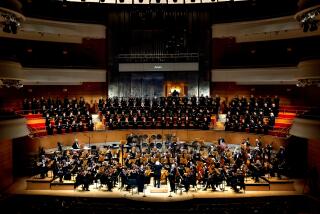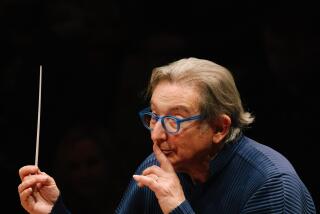Lieberson’s grace fills Disney Hall
- Share via
“Grace” has several meanings. It can denote the quality of pleasing, a refinement of movement or expression, the conferral of favor on another and, of course, thanks or thanksgiving. In music, we have the grace note, that little dancing embellishment that delays, ever so slightly, the main note and makes its arrival all the more a pleasure.
Peter Lieberson and his music have been the focus of the Los Angeles Philharmonic the last few days, and with that attention a kind of grace, in all its various meanings, has descended on Walt Disney Concert Hall. The occasion for his visit was the premiere of “Neruda Songs,” written for his wife, mezzo-soprano Lorraine Hunt Lieberson, and commissioned by the Philharmonic. Those five songs -- pure, guileless, timeless, transcendent expressions of love, stunningly performed -- seem almost untouched by technique. Where does such music come from?
Lieberson answered a slightly different question Monday night when he spoke in a preconcert discussion before the Philharmonic’s Green Umbrella program, for which he conducted the orchestra’s New Music Group. The question was, how long did it take to write the “Neruda Songs”?
We already knew the selection of texts was slow; that required a year. And he has said the music flowed quickly, intuitively. But the answer he gave was 30 years.
That answer, and the music Lieberson went on to present Monday, did a good job of showing us where the “Neruda Songs” came from. Lieberson has, for three decades, devoted his life to Buddhist practice and teaching. The “Neruda Songs,” so simple and direct and unafraid of beauty, have the quality of enlightenment. Monday’s music could be heard as the last leg of a 30-year voyage of self-discovery -- or perhaps more accurately, selfless discovery.
Part of the program was a conferring of favor on a British composer with whom Lieberson feels close musical kinship. It was an affecting tribute to Oliver Knussen, who was to have been this year’s Ojai Festival music director but is instead in a London hospital recovering from abdominal surgery. Lieberson led a beguiling performance of Knussen’s “Two Organa,” playful, intricately colored updates of an ancient musical practice.
The organa were bookended by works by Knussen students: Mark-Anthony Turnage’s “Snapshots” and Julian Anderson’s “Alhambra Fantasy,” written for Knussen and the London Sinfonietta. Lieberson also conducted his own “Free and Easy Wanderer,” which he dedicated to Knussen in 1998. The personality of each of these pieces differs, as does the instrumentation, but all share a dazzling sense of refinement and gamesmanship. In each, a small musical idea, just a chord in Lieberson’s case, is put into play, and the results are elusive and complex. Grace notes abound.
If the “Neruda Songs” sound effortless, an earlier cycle, the “Rilke Songs” -- which came after intermission and which Lieberson wrote for his wife in 2001, shortly after they were married -- demonstrate some of the process of letting go of technique.
The texts are deep but tortured in their effort to express mystic power. Their setting for voice and piano is expressionistic, and Hunt Lieberson, accompanied by Robert Tweten, found in them the occasion for powerful drama.
There was also drama to be heard in the composer’s Piano Quintet, written the following year and performed by four Philharmonic string players and Gloria Cheng. The strings seem to struggle, even to the point of tying themselves into the knot of a fugue. But the piano writing is bell-like, a clarion call to peace.
Lieberson’s Horn Concerto ended the program. William Purvis, for whom it was written, was the impressive soloist. The French horn, Lieberson has written, is to him the instrument of the heart. In the first movement, he let himself go. That is, he let the horn go, in sinuous, rhapsodic writing that suggests a kind of hunting call from another world. In the second movement, harmonies evoke big bands of yore. The horn becomes an instrument of contained joy; leaping syncopated rhythms are part Stravinsky, part jazz. Lieberson dances his way to enlightenment.
The performances all evening lived up to the standards of gracefulness. It should probably come as no surprise that Lieberson is an elegant conductor. The grace goes deep.
More to Read
The biggest entertainment stories
Get our big stories about Hollywood, film, television, music, arts, culture and more right in your inbox as soon as they publish.
You may occasionally receive promotional content from the Los Angeles Times.











